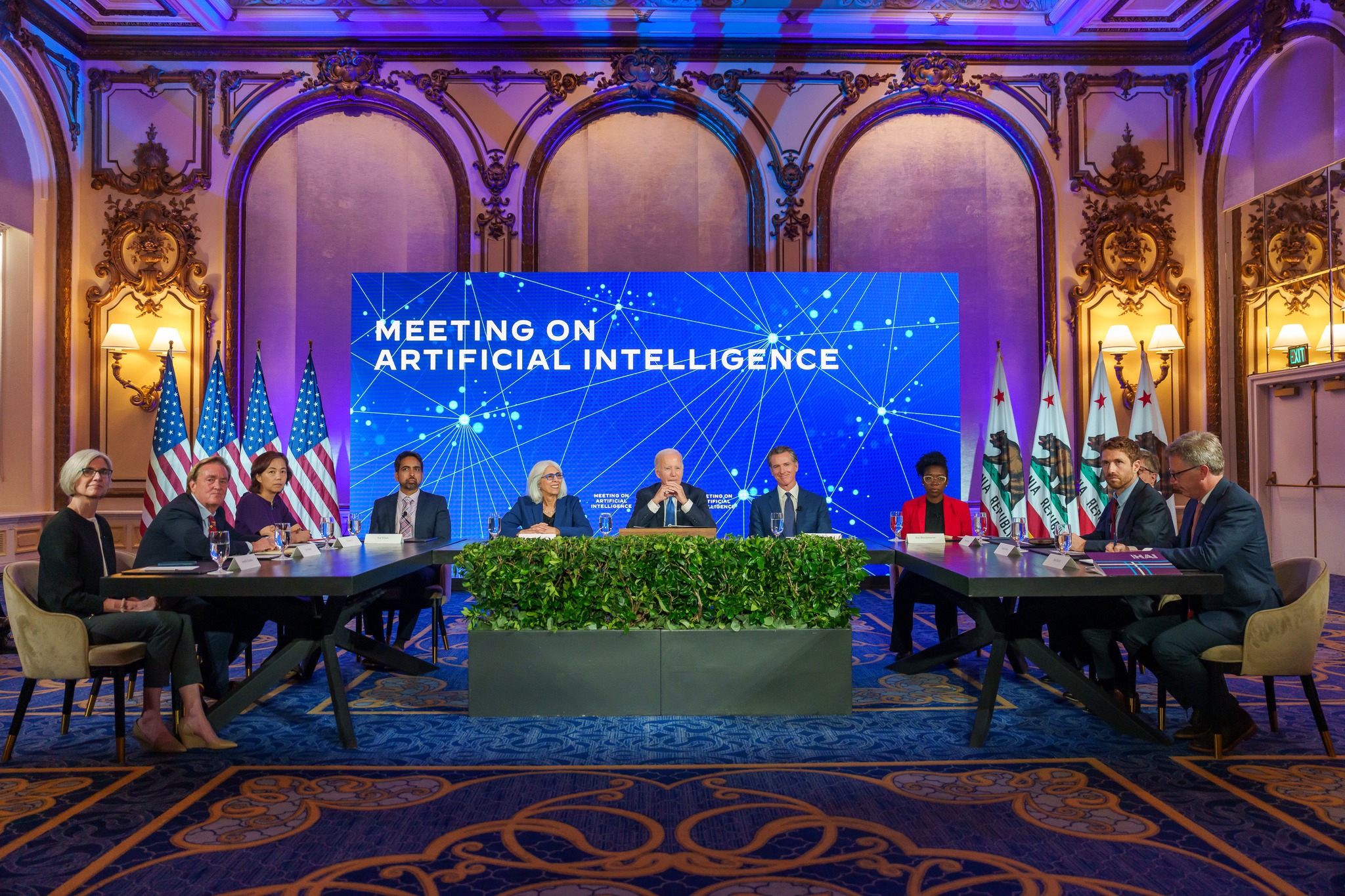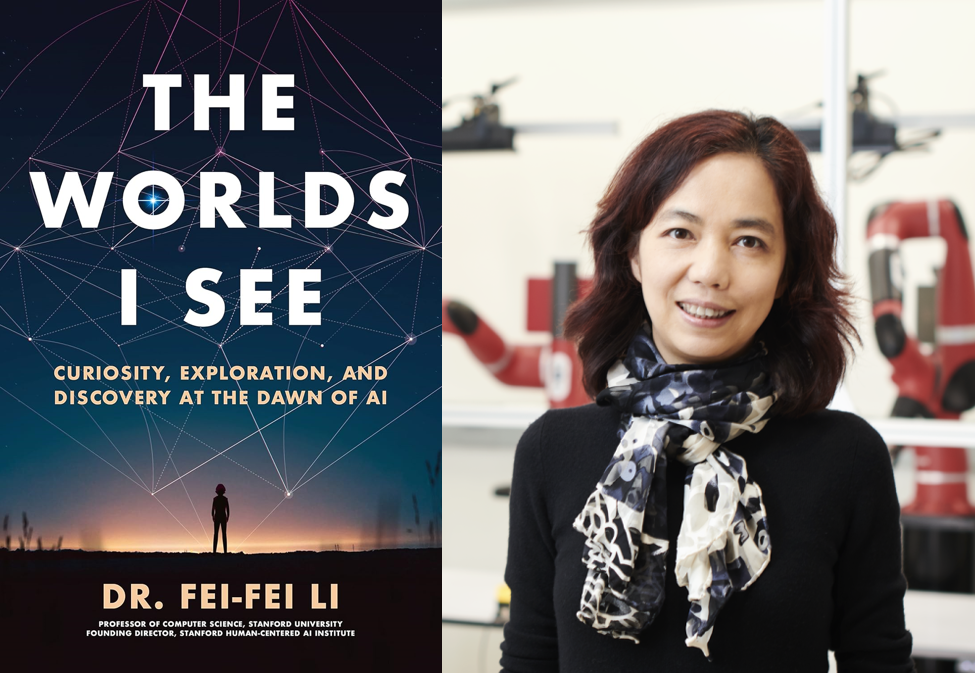Image: President Joe Biden hosts a meeting on AI, Tuesday, June 20, at The Fairmont hotel in San Francisco. (Official White House Photo by Adam Schultz)
Stanford Computer Science Professor and Radical Ventures Scientific Partner, Dr. Fei-Fei Li, met with President Joe Biden and other key leaders from academia and the public sector in San Francisco to discuss AI’s development, challenges, and ideas for enhancing democracy and healthcare. She shares her key messages from the conversation this week.
My colleague Rob Reich and I, Co-Directors of the Stanford Institute for Human-Centered Artificial Intelligence (HAI), share the belief that in order to ensure the US leads on AI responsibly and stewards AI’s integration into society, a moonshot mentality must be urgently applied to AI development.
AI has the potential to solve many unsolved problems ranging from curing cancer and discovering life-saving drugs to improving the healthcare delivery system.
However, there is an imbalance in the AI development ecosystem that threatens the basic science research needed for a moonshot mindset. The main reason for this imbalance is access to the vast amount of compute and data required to train these systems. As noted in Stanford’s 2023 AI Index, there were 32 significant industry-produced machine learning models in 2022 compared to just three produced by academia. Building state-of-the-art AI systems increasingly requires resources that industry actors inherently possess in greater amounts compared to nonprofits and academia. Addressing this imbalance at moonshot scale will require a significant public sector investment in AI, which will need to include the National AI Research Resource and national labs similar to CERN inside of the US.
Overall, it was an honour to engage in a thoughtful, nuanced and diverse conversation with President Joe Biden, as well as the Director of the Office of Science and Technology Policy Dr. Arati Prabhakarm, and California Governor Gavin Newsom. It was also a pleasure to contribute to this dialogue alongside Khan Academy Founder Salman Khan, UC Berkeley’s Doudna Lab Founder Jennifer Doudna, Founder of the Algorithmic Justice League Dr. Joy Buolamwini, AI2 Founding CEO Oren Etzioni, Humane Tech Co-Founder Tristan Harris, Common Sense Founder and CEO Jim Steyer, and my colleague, Stanford Professor Rob Reich.
Dr. Fei-Fei Li has been working with policymakers nationally and locally to ensure the responsible use of technologies, including congressional testimony on the responsibility of AI in 2018, her service as a member of the California Future of Work Commission for the Governor of California in 2019 – 2020, and a member of the National Artificial Intelligence Research Resource Task Force (NAIRR) for the White House Office of Science and Technology Policy (OSTP) and the National Science Foundation (NSF) in 2021-2022. Learn more and follow Dr. Fei-Fei Li.
AI News This Week
-
Watch: Why Geoffrey Hinton is worried about the future of AI (University of Toronto)
Geoffrey Hinton, known as the “Godfather of AI,” discusses the need for responsible development of AI and what he views as some of the most promising opportunities for society arising from the technology. Included in the many examples he provides are improvements in healthcare, for example accessing more information from diagnostic tools such as CAT scans, and understanding volumes and dimensions of cancers. He also cites better weather predictions including early warnings for floods and earthquakes, and designing new nano materials such as inputs for more efficient solar panels. While acknowledging well known risks, he highlights opportunities for international collaboration to limit and control the technology’s development, and to research long term impacts on society.
-
AI 100: The most promising AI startups of 2023 (CB Insights)
The AI 100 represents the top 100 private AI companies worldwide, as selected by CB Insights, for their immense promise. Among this year’s selections are five Radical Ventures portfolio companies. Cohere is acknowledged for its delivery of enterprise-grade language AI models with minimal latency. You.com, powered by a team of research scientists with backgrounds from Salesforce and Stanford, is revolutionizing the search engine landscape by bringing generative AI to search results. Xanadu‘s pioneering work revolves around the development of photonic quantum computers that are both practical and accessible for individuals. Twelve Labs, has created an AI-powered platform that comprehends video content and context with remarkable accuracy. Covariant AI empowers robots to autonomously and accurately pick, pack and sort thousands of products in distribution centres and warehouses.
-
Muon celebrates launch of first satellite in Climate Constellation (SpaceNews)
Radical Ventures portfolio company Muon Space successfully launched its first satellite into orbit via the SpaceX Transporter-8 rideshare flight. The company plans to conduct two launches in 2024 to test sensors designed to provide sub-hourly global climate measurements. These sensors aim to address specific climate applications, particularly related to forest fires, floods and water risks. The company has formed partnerships with major technology companies like Google and nonprofits such as the Environmental Defense Fund. Muon’s approach combines expertise in both science and engineering to tackle operational challenges driven by climate and national security concerns.
-
Meet the World Economic Forum’s Technology Pioneers of 2023 (World Economic Forum)
Each year, The World Economic Forum introduces a fresh wave of Technology Pioneers, who become part of a global community of early-stage startups dedicated to developing and implementing groundbreaking technological innovations. This community collaborates closely with influential figures from politics, business, and culture to confront the pressing challenges faced by humanity and our planet. The 2023 cohort of Technology Pioneers is trailblazing new frontiers in vital domains such as healthcare and food production, propelled by state-of-the-art technologies. Notably, among this year’s participants are Radical Ventures’ portfolio companies: ClimateAI, a pioneer in climate risk modeling harnessing the power of AI to provide unparalleled predictions of extreme weather events and climate patterns; and Twelve Labs, which offers an AI-powered platform that comprehends the intricate context embedded within videos.
-
New technologies and jobs in Europe (NBER)
Researchers analyzing the impact of deep learning and AI on the job market between 2011 and 2019 found that industries where AI could be most useful did not experience job reductions. In fact, there was a 5% increase in the number of employed workers in more highly skilled jobs vulnerable to AI, such as white-collar office work involving data analysis. The research indicates that new technology can increase demand for skills-based workers. According to Indeed, generative AI related job postings in the US increased 20% last month – more than doubling from 2021.
Radical Reads is edited by Leah Morris (Senior Director, Velocity Program, Radical Ventures).





